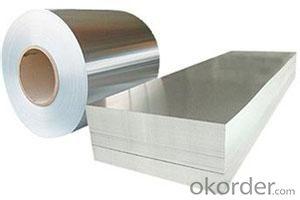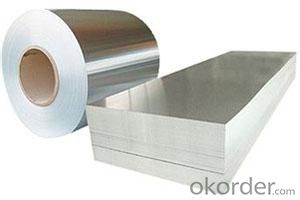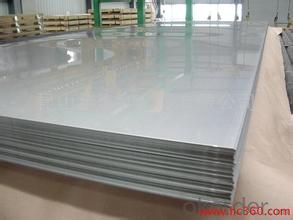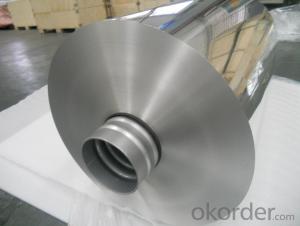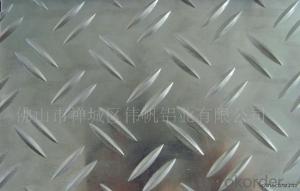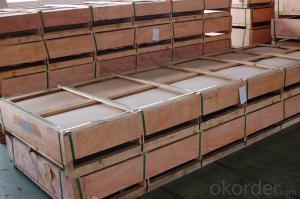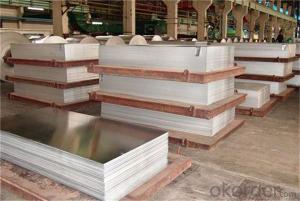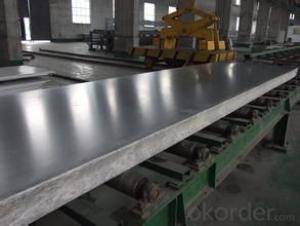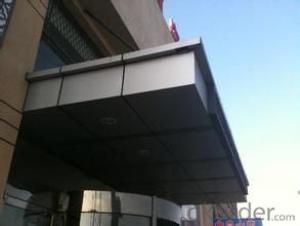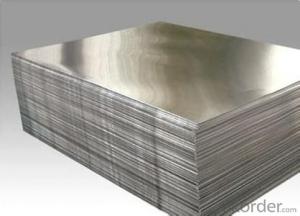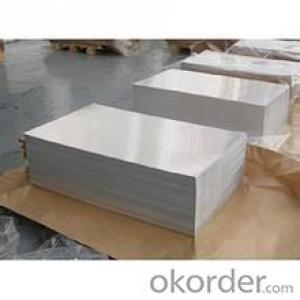Aluminum Design Sheets - Wholesale Aluminum Mill Finish Panel in China UAE
- Loading Port:
- China main port
- Payment Terms:
- TT or LC
- Min Order Qty:
- 1 m.t.
- Supply Capability:
- 3 m.t./month
OKorder Service Pledge
OKorder Financial Service
You Might Also Like
Aluminium is a relatively soft,durable, lightweight, ductile and malleablemetal with appearance ranging from silvery to dull gray,depending on the surface roughness. It is nonmagnetic and does not easilyignite. A fresh film of aluminium serves as a good reflector (approximately92%) of visible light and an excellent reflector (as much as98%) of medium and far infrared radiation. The yield strength of pure aluminium is 7–11 MPa,while aluminium alloys have yield strengths ranging from200 MPa to 600 MPa. Aluminium has about one-third the density and stiffnessof steel. It iseasily machined,cast, drawn and extruded.
Alu Plate
Alloy: AA1050, 1060, 1100, AA3003, 3005, 3015, 5052, 5754, 5083,8011,etc
Temper:H14/16/18/22/24/32,HO etc.
Thickness:0.2mm—100mm
Width:100mm—2300mm (Can be slitted)
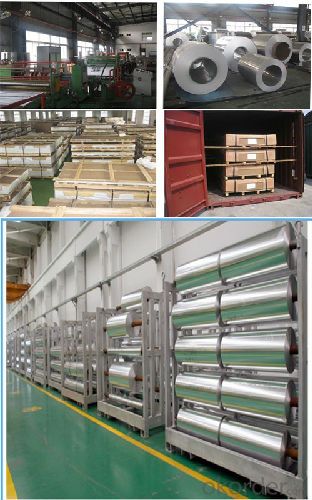
Application: Foil stock, Circles, Roofing, Canstock, Marine plate,Anti-sliperypurpose in vehicles, packing and appliance.
According to the order of the thermal conductivity of the metal, corrosion resistance and production cost, refrigerator interior sheet metal is chosen instead of aluminum other metals, to ensure its good thermal conductivity of the premise, as far as possible to reduce costs and the choice of corrosion-resistant material processing, aluminum is the best choice.
Secondly, in order to increase the length of the liner internal exchange area and the outside air heat, refrigerator interior selected embossing plate instead of the flat plate. In the absence of refrigerator interior space cause pressure to increase the use of embossed aluminum air tank wall contact area for a more efficient uniform heat exchange.
Speaking on the cooling rate: according to the laws of physics, thermal conductivity of aluminum is 237W / mK, the thermal conductivity of iron is 80W / mK, the thermal conductivity of the larger the number, the better the thermal conductivity, under the same conditions cooling faster the cooling effect is better. Using embossed aluminum evaporator, cooling rate is 3 times the wire tube evaporator. You can do a little to test in the refrigerator freezer compartment through an aluminum plate on a drop of water drops, 5 seconds into the ice, cooling is very fast!
- Q: Can the aluminum sheets be used for soundproofing applications?
- Yes, aluminum sheets can be used for soundproofing applications. Aluminum is a good conductor of sound, but when used in combination with other sound-absorbing materials or in soundproofing structures, it can effectively reduce noise transmission.
- Q: This question asks for a list of various methods used to treat the surface of aluminum sheets to improve their properties or appearance.
- <p>There are several types of surface treatment for aluminum sheets, each serving different purposes. These include: Anodizing, which creates a protective oxide layer and enhances corrosion resistance; Chemical Conversion Coating, such as chromate conversion, to improve paint adhesion and corrosion resistance; Electrolytic Polishing, which provides a smooth, shiny surface; Powder Coating, an electrostatic process that applies a durable coating; Paint Coating, offering a wide range of colors and finishes; and Mechanical Polishing, which smooths the surface and improves reflectivity. Each treatment has its specific applications and benefits, depending on the desired outcome for the aluminum sheet.</p>
- Q: Are aluminum sheets suitable for aircraft manufacturing?
- Yes, aluminum sheets are suitable for aircraft manufacturing. Aluminum is widely used in the aerospace industry due to its unique combination of properties such as lightweight, high strength, corrosion resistance, and excellent formability. These characteristics make aluminum an ideal material for constructing various aircraft components, including fuselages, wings, and structural parts. Additionally, aluminum alloys can be easily joined, allowing for efficient manufacturing processes. Overall, aluminum sheets play a crucial role in aircraft manufacturing, contributing to the overall performance, durability, and safety of the aircraft.
- Q: Can 101 aluminum sheets be customized in terms of size and thickness?
- Certainly! It is possible to customize the size and thickness of 101 aluminum sheets. One can achieve the desired size and thickness by employing diverse cutting methods like shearing, sawing, or laser cutting. Moreover, rolling or stretching the aluminum sheets can also result in the desired thickness. By personalizing the size and thickness of aluminum sheets, they can be tailored to meet specific applications or requirements.
- Q: Can aluminum sheets be used for food processing equipment?
- Yes, aluminum sheets can be used for food processing equipment. Aluminum is a popular choice in the food industry due to its numerous beneficial properties. It is lightweight, durable, corrosion-resistant, and has excellent thermal conductivity. These properties make aluminum sheets ideal for various applications in food processing equipment, such as mixing bowls, cooking utensils, baking trays, and food storage containers. Additionally, aluminum is non-toxic and does not react with food, ensuring the safety and quality of the processed products. However, it is important to note that aluminum should not come into direct contact with acidic or alkaline foods, as it may react and affect the taste or quality of the food. In such cases, a protective barrier or lining should be used. Overall, aluminum sheets are widely used in the food industry due to their versatility, durability, and food-safe characteristics.
- Q: How do aluminum sheets perform in terms of creep resistance?
- Aluminum sheets are known for their excellent creep resistance. Creep is the tendency of a material to slowly deform under a constant load over time. Compared to other metals, such as steel, aluminum has a relatively low creep rate, meaning it deforms at a slower rate under the same load and temperature conditions. This makes aluminum sheets suitable for applications requiring dimensional stability and resistance to long-term deformation. Additionally, aluminum's low creep resistance allows it to withstand high temperatures without significant deformation, making it suitable for use in various industries, including aerospace, automotive, and construction. However, it is important to note that the creep resistance of aluminum sheets can vary depending on the alloy used, heat treatment, and other factors, so it is essential to choose the appropriate aluminum alloy and design for specific applications to optimize creep resistance.
- Q: This question asks for a method to measure the thickness of an aluminum sheet.
- <p>To determine the thickness of an aluminum sheet, you can use a micrometer or a caliper, which are precise measuring tools. Place the sheet on a flat surface and measure from one side to the other at multiple points to account for any inconsistencies. Alternatively, you can use an ultrasonic thickness gauge, which is especially useful for non-contact measurements. For a quick estimate, a simple ruler can give you a rough idea, but for high precision, specialized tools are necessary. Always ensure the measuring device is calibrated and used correctly to get accurate results.</p>
- Q: Can 101 aluminum sheets be used in electrical or electronic components?
- Yes, 101 aluminum sheets can be used in electrical or electronic components. Aluminum is a versatile metal that possesses excellent electrical conductivity and is widely used in various electrical and electronic applications. It is commonly used as a conductor in power transmission lines, electrical cables, and wiring. Additionally, aluminum sheets can be used in the manufacturing of electronic components such as heat sinks, circuit boards, and enclosures due to their lightweight, corrosion-resistant, and thermally conductive properties. However, it is important to note that the specific grade and alloy of aluminum, as well as other factors such as thickness and surface treatment, may also influence its suitability for certain electrical or electronic applications.
- Q: What are the different methods for cutting aluminum sheets?
- There are several methods for cutting aluminum sheets, including shearing, sawing, laser cutting, waterjet cutting, and plasma cutting.
- Q: Can aluminum sheets be used for electrical enclosures?
- Yes, aluminum sheets can be used for electrical enclosures. Aluminum is a popular choice for electrical enclosures due to its excellent conductivity, corrosion resistance, and lightweight properties. It is a good conductor of electricity, allowing for efficient distribution of electrical current within the enclosure. Additionally, aluminum has a high resistance to corrosion, making it suitable for outdoor and harsh environment applications. Its lightweight nature also makes it easier to handle and install. Overall, aluminum sheets are a reliable and commonly used material for electrical enclosures.
Send your message to us
Aluminum Design Sheets - Wholesale Aluminum Mill Finish Panel in China UAE
- Loading Port:
- China main port
- Payment Terms:
- TT or LC
- Min Order Qty:
- 1 m.t.
- Supply Capability:
- 3 m.t./month
OKorder Service Pledge
OKorder Financial Service
Similar products
Hot products
Hot Searches
Related keywords
